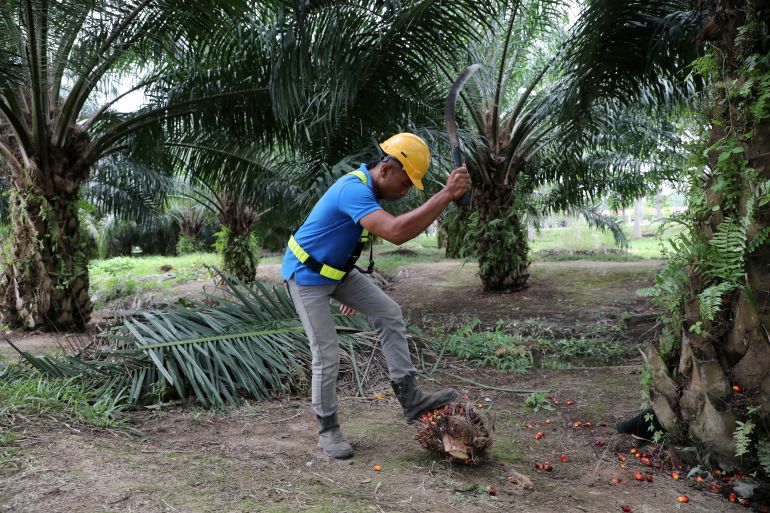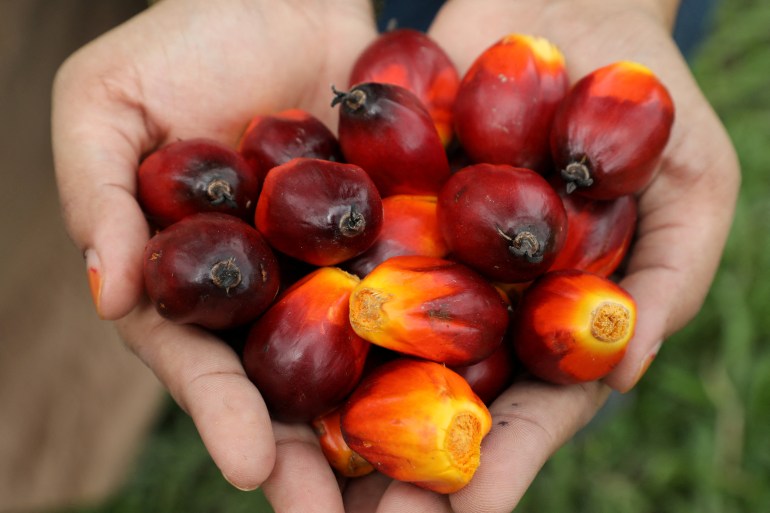Malaysian palm oil giant seeks to repair image after abuse claims
Sime Darby Plantation Berhad is fighting a US ban on its products after reported labour violations at its plantations.

For years, Sime Darby Plantation Berhad, the world’s largest oil palm grower, has touted itself as the leading global producer of environmentally-friendly palm oil.
The Malaysia-based plantation company’s environmental bona fides have been recognised by the Roundtable for Sustainable Palm Oil (RSPO), a membership organisation that sets standards for the production and procurement of sustainable palm oil.
Keep reading
list of 4 items‘Shireen Abu Akleh’s life matters,’ Al Jazeera tells UN
Biden says time to ‘stand up to the gun lobby’ after Texas attack
N Korea fires three missiles hours after Biden leaves Asia
But at a time when palm oil is in greater demand than ever amid shocks to the global supply of edible oils, the firm is fighting to redeem its image – along with its ability to export to the United States, where the Customs and Border Protection (CBP) agency has banned its products for more than a year following allegations of forced and convict labour at its Malaysian plantations.
The allegations against Sime Darby include threats and intimidation, arbitrary penalties, physical abuse, restriction of movement and the retention of identity documents.
Hari Rai, a Sime Darby worker from Nepal who has worked on its plantation for nine years, said the company confiscated his passport when he started his employment. He said he also witnessed workers being threatened with dismissal for making mistakes and being denied sick leave.
Still, Rai, who asked to use a pseudonym to avoid retribution, said he is mostly satisfied with his work and conditions at his plantation have improved in recent years.
“Previously, when I arrived in Malaysia, the company withheld my passport and I didn’t have possession of it,” Rai, who has worked on a plantation for nine years, told Al Jazeera. “I could not visit other states in Malaysia without a passport, and to get approval I had to have a solid reason to get my passport [back].”
Five other workers contacted by Al Jazeera declined to comment.

In the past month, as multinational corporations based in the US and Europe have publicly called for more transparency from Sime Darby, the company has filed documentation with CBP in a bid to overturn the import ban.
It is unclear how much of a material difference overturning the ban would make to Sime Darby. Malaysian exports of palm oil, which is used in the production of food, cooking oil, cosmetics, soap and shampoo, are booming after its larger competitor, Indonesia, last month instituted a three-week ban on palm oil exports in order to bring down local prices.
At the same time, a global shortage of cooking oil is forcing some buyers in Europe to reckon with their professed aversion to the negative environmental and social fallout of palm oil consumption.
For Sime Darby and other major players in the industry, the stakes in challenging CBP’s ban could be mainly reputational.
Besides plantation workers, the central actors in CBP’s case against Sime Darby have, for the most part, offered few specifics about the alleged violations, while some industry advocates have written off the claims as being based on outdated information or distorted accounts produced by non-governmental organisations.
CBP, which announced in January it had confirmed the accusations against Sime Darby, has not released details of the evidence on which it based its findings.
In a response to questions from Al Jazeera, Sime Darby didn’t address allegations of mistreatment at its plantations but pointed to reforms it has undertaken in the recruitment of foreign laborers, who make up the majority of the company’s Malaysian workforce.
“We have also improved our internal controls and stepped up the execution of our continuous improvement plan,” a spokesperson said. “The measures we have recently instituted close any gaps that may have existed.”
The spokesperson also forward the company’s latest sustainability report, which outlines various programs to improve labour conditions in Malaysia and was included in the filings to the CBP.
Impactt, a London-based ethical supply chain consultancy, has not released the findings of an audit commissioned by Sime Darby to examine its practices. An Impactt representative told Al Jazeera the organisation’s work with the firm is subject to confidentiality.
Perhaps the fullest account of conditions at the plantations comes from a petition filed with the CBP by the non-governmental organisation Liberty Shared, which carried out its own investigation of Sime Darby’s operations.
Liberty Shared said plantation workers it spoke with reported mistreatment, including arbitrary penalties and pay cuts, sexual harassment, and physical abuse, despite the introduction of measures such as a hotline for workers’ complaints.
“If you’re going to run the largest business of anything, you should have control of it,” Duncan Jepson, managing director of Liberty Shared, told Al Jazeera. “Size is not an excuse for something to stop working.”
Growing demand
The Sime Darby case highlights the challenge within the palm oil industry of balancing furious demand for its product with respect for workers and environmental concerns. As the world faces cooking oil shortages driven by poor soybean harvests in drought-stricken regions of South America and the Ukraine war’s disruption of sunflower production, palm oil producers face mounting pressure to fill the gap.
Palm oil prices rose 75 percent in late April compared with the year prior, according to the analytics firm Gro Intelligence. Rising prices for the commodity led Indonesian President “Joko” Widodo to temporarily ban exports on April 22, driving prices up another 7.5 percent that week. Indonesia lifted the ban on May 23.
Sathia Varqa, co-founder of the advisory firm Palm Oil Analytics in Singapore, said edible oil supply chains are facing “massive” bottlenecks.
“The implications are obvious – tight supply and higher food prices globally,” Varqa told Al Jazeera.
Some Western buyers that had previously sworn off palm oil due to sustainability concerns, such as United Kingdom supermarket chain Iceland, have since announced they will resume purchases of the commodity.
In the longer term, industry boosters in Malaysia and Indonesia, which together account for more than 85 percent of the world’s palm oil production, see potential for growth in the Middle East and North Africa. But commodities experts say palm oil producers are facing difficulties in ramping up supply, including labour shortages that have been exacerbated by border restrictions during the pandemic.
“You have a long-standing policy to limit foreign workers and not many Malaysian workers want to do these jobs,” James Fry, chairman of the commodity-focused consultancy LMC International, told Al Jazeera. “It’s not a trivial job to harvest oil palm.”
Meanwhile, rights advocates have long said that palm oil’s reliance on low-paid workers, many of whom are migrants, has created ample conditions for exploitation.
Justine Nolan, the director of the Australian Human Rights Institute, said palm oil presents “the perfect storm” for labour exploitation.
“You have a lack of a unionised workplace, a preponderance of migrant workers not only from different regions, but different countries, so they speak different languages and there’s a lack of networking with each other, and a sense of vulnerability from those issues,” Nolan told Al Jazeera, adding that she was speaking generally of the industry.
Nolan briefly served on a human rights working group established by Sime Darby in response to the CBP ban, but resigned just one month into the role, citing a lack of information from the firm about what is happening on its plantations.
“There was confusion and a lack of clarity around the information that the group would receive,” Nolan said, adding that the import ban appeared to have been a “wakeup call” for the company.
“I do think there’s a genuine interest in improving, but it’s a complicated thing,” she said.

For some players in the corporate world, improvements have not come fast enough.
Cargill, one of the world’s largest food corporations, suspended purchases from the plantation company earlier this year. In April, Cargill publicly accused the company of lacking transparency in how it has addressed labour conditions. Other household names, including General Mills, Hershey and Ferrero, have also publicly shunned the company.
Sime Darby itself has acknowledged some of the allegations against it, including that investigators found evidence of all 11 indicators of forced labour as defined by the International Labour Organisation.
In its sustainability report, the company listed several steps to improve conditions, including improvements to employee housing and the introduction of a confidential whistleblower hotline to field worker complaints.
Sime Darby also said in the report that it had improved its process for recruiting foreign workers, in part by hiring labour consultant Andy Hall, an outspoken advocate who has worked with other Malaysian companies accused of using forced labour. Hall told Al Jazeera his work with the company prevented him from speaking on the record.
Perhaps most significantly, the company announced a campaign to pay back fees that its former recruiting partners abroad had charged migrants who came to work on the Malaysian plantations. The firm has said the repayments will total 82 million ringgit ($18.6m) and be paid out to 34,000 current and former workers.
Nolan, the Australian human rights and supply chain expert, described the step as “positive”.
“Doing more social dialogue, giving workers avenues to discuss grievances, that’s positive,” she said. “I haven’t seen the report to CBP yet, but I’d like to. … what were the problems found and how do we address them.”
Jepson of Liberty Shared is more sceptical of the firm’s “piecemeal” reforms.
“You’re either going to deal with it holistically and restructure it, or you’re going to cherry-pick the things you think are going to achieve a better image or overall picture, without having to deal with all the issues in front of you,” he said.